 |
Fuel Cells for Power |
 |
Fuel Cells for Power |
|
|
|
|
||
|
|
||||
|
|
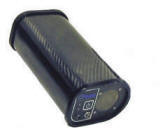 20W Adaptive Materials e20 Fuel Cell 28cm x 9cm x 13cm 1.5 kg 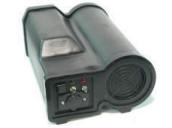 50W Adaptive Materials e50 Fuel Cell 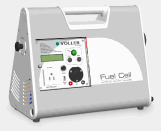 100W Voller Automatic Battery Charger (ABC) 38cm x 30cm x 20cm 9 kg 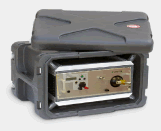 100W Voller Remote Battery Charger (RBC) 178mm x 448mm x 410mm 8 kg  Jadoo N-Gen PEM Fuel Cell 4" x 4" x 7.5" 5 lbs 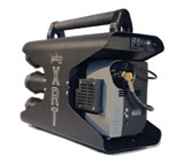 Jadoo XRT Portable Power PEM Fuel Cell 7" x 18" x 14" 50 lbs. |
Proton Exchange Membrane (PEM) vs. Solid Oxide Fuel Cells (SOFC) Fuel Cells used in commercial applications can be divided into two major groups which are classified by the electrolyte the fuel cell employs - the proton exchange membrane (PEM) fuel cell and the solid oxide fuel cell. PEM fuel cells utilize a thin membrane as its electrolyte, which is made from a specially treated material that appears similar to a plastic sheet. The proton exchange membrane fuel cell electrolyte allows positively charged ions to pass through it but blocks negatively charged electrons. Hydrogen gas (H2) being introduced on one side of the electrolyte (the anode) is ionized by a catalyst and splits into two hydrogen ions and two electrons. The positively charged ions pass can through the electrolyte, but the electrons must be conducted through an external circuit to the other side of the fuel cell (the cathode). As the electrons are conducted, electric power is produced which can be used to do all types of useful things like power motors or lights or any device which requires direct current or DC power. On the cathode side of the fuel cell, oxygen from the air (O2) comes in contact with a catalyst to form two separate oxygen atoms. Each oxygen atom attract two hydrogen ions through the electrolyte and with two electrons from the external circuit combine to form a water molecule. Due to the membrane electrolyte, PEM fuel cells can operate at a relatively low temperature (about 80 degrees C, or about 175 degrees F) in contrast to other electrolytes which requires temperatures as high as 1000 degrees C for operation. However they require climate control in harsh environments to maintain the integrity of the membrane. PEM fuel cells also reach efficiencies of about 40%-50%. For fuels such as methanol or gasoline to be used, a reformer must first be employed to extract the hydrogen before introduction to the fuel cell. how Solid oxide fuel cells utilize a dense, gas-tight electrolyte to separate the fuel on the anode side of the fuel cell from the air on the cathode side. These fuel cells are usually built in tubular structures with a porous cathode to allow air from the outside to reach the electrolyte and a porous anode to allow fuel to flow to the electrolyte. When the electrolyte is heated to temperatures up to 1000 degrees C, oxygen in the air flowing through the cathode ionizes forming two oxygen ions. These oxygen ions are allowed to pass through the electrolyte material where they encounter the fuel passing through the anode. A chemical reaction occurs resulting in water, carbon dioxide, heat and electrons. These electrons pass through an external circuit back to the cathode which is negatively charged creating DC current. Because of the high operating temperatures, the catalyst used in a PEM fuel cell to speed the reaction is not necessary in a solid oxide fuel cell. High operating temperatures also allow solid oxide fuel cells to run on methane, propane, butane, or other standard fuels including diesel and make this form of fuel cell more suitable to use in harsh environments.. A reformer is not necessary to extract hydrogen from the fuel, but the sulfur needs to be removed before it can be used. Power generation efficiencies for solid oxide fuel cells can range up to about 60 percent
Commercially Available COTS
PEM and SOFC Fuel Cells Flexiva Automation & Robotik - Flexiva is German company that produces fuel cells for both off-grid power applications and portable power applications. Flexiva designs PEM fuel cells that run on Hydrogen. Their 20W and 40W products provide 12-volt or 24-volt DC power and their off-grid power fuel cells are scalable up to 10kW and are intended to provide power in remote areas. Hydrogenics Corporation Hydrogenics Corporation has developed a large variety of commercial off-the-shelf fuel cells intended to provide backup power for mobile and stationary applications. Electric vehicles and stationary power supplies can be supported by the Hydrogenics product line. The Hydrogenics PEM fuel cell system is available in a variety of scalable options based on user requirements. Fuel cell power can range in size from 4kW 65kW and multiple DC voltage output options are available for 24, 36, 48, and 72-volt requirements. IdaTech - Specializing in fuel processing technologies to extract hydrogen, IdaTech fuel cells can run on a variety of fuels including methanol, ehtanol, diesel, natural gas, and other biofuels. IdaTech has a fairly extensive line of PEM fuel cell products, everything ranging from portable power applications at about 250W to backup power applications which supply as much as 15kW. Jadoo - Jadoo has a rather impressive line of PEM fuel cell products including a very nice fuel canister and refill system. Jadoo fuel cells are lightweight and portable and run on hydrogen. They have a battery replacement product that sits at about 5lbs and a portable power product at 50lbs that provides 100W of AC or DC power. Both products utilize the same 100W fuel cell, but by accessorizing with the XRT package one can have a portable power unit. Nanodynamics, Inc. - NanoDynamics has developed a 12-volt, 50W solid oxide fuel cell that is compatible with either propane or butane. This system is a lightweight, fully regulated portable power system that is an ideal power source for recreational, military, commercial and industrial power applications. ReliOn, Inc. - ReliOn has developed a system of modular, cartridge-based, proton exchange membrane fuel cells to deliver off-grid power in remote locations. The base products of their system are the T-1000 (1.2kW) and T-2000 (2Kw) fuel cells which use industrial grade hydrogen as their fuel and supply 24 or 48VDC. ReliOn has already built an outdoor enclosure for customers who require an outdoor backup system and have fielded many of these systems with government and commercial customers. SRE - Manufactured by H-way out of Portugal, SRE offers PEM fuel cell components for experimentation as well as a commercially available PEM fuel cell product that supports 100W of DC power (6, 12, 24, or 48-volts) for portable power applications. SRE fuel cells run on Hydrogen.
Voller Energy
Voller Energy carries 100W and 300W versions of their PEM fuel cell
technology to suit a variety of applications. Hydrogen gas is used to
fuel the device and is supplied to the commercial off-the-shelf fuel cell either in a refillable
canister or by attaching an external hydrogen cylinder (available
through a hydrogen gas supplier). The Voller Fuel cells can be used to
power electronics, recharge batteries, or supply AC or DC power in the
field. Voller Engineers are looking into developing propane or butane
powered units for use on boats and RVs. |
|
 Teak Furniture |
|
|